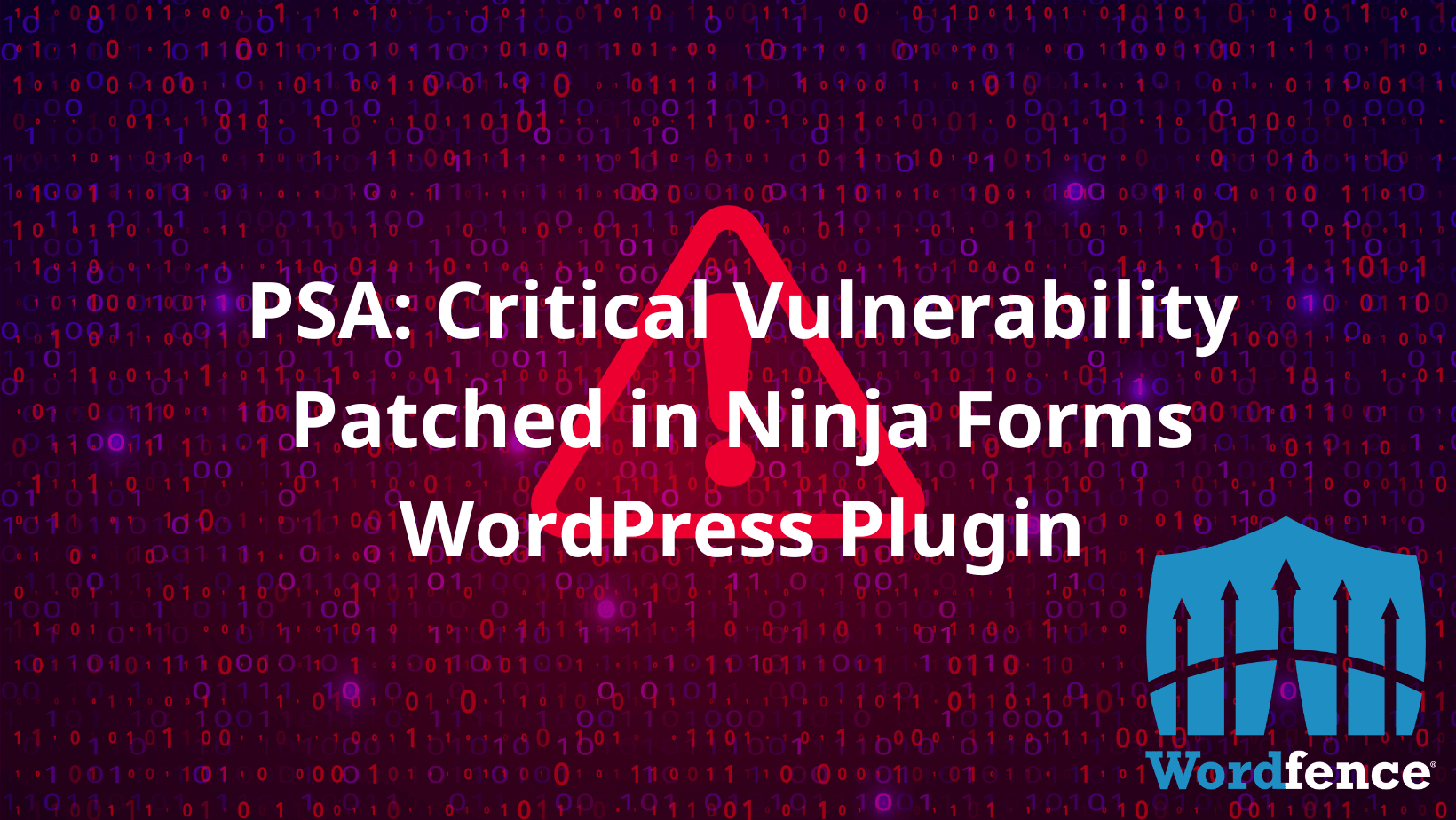PSA: Critical Vulnerability Patched in Ninja Forms WordPress Plugin
On June 16, 2022, the Wordfence Threat Intelligence team noticed a back-ported security update in Ninja Forms, a WordPress plugin with over one million active installations. As with all security updates in WordPress plugins and themes, our team analyzed the plugin to determine the exploitability and severity of the vulnerability that had been patched.
We uncovered a code injection vulnerability that made it possible for unauthenticated attackers to call a limited number of methods in various Ninja Forms classes, including a method that unserialized user-supplied content, resulting in Object Injection. This could allow attackers to execute arbitrary code or delete arbitrary files on sites where a separate POP chain was present.
There is evidence to suggest that this vulnerability is being actively exploited in the wild, and as such we are alerting our users immediately to the presence of this vulnerability.
This flaw has been fully patched in versions 3.0.34.2, 3.1.10, 3.2.28, 3.3.21.4, 3.4.34.2, 3.5.8.4, and 3.6.11.WordPress appears to have performed a forced automatic update for this plugin, so your site may already be using one of the patched version. Nonetheless, we strongly recommend ensuring that your site has been updated to one of the patched versions as soon as possible since automatic updates are not always successful.
Wordfence Premium, Wordfence Care, and Wordfence Response customers received a rule on June 16, 2022 to protect against active exploitation of this vulnerability. Wordfence users still using the free version will receive the same protection on July 16, 2022. Regardless of your protection status with Wordfence, you can update the plugin on your site to one of the patched versions to avoid exploitation.
Affected Plugin: Ninja Forms Contact Form – The Drag and Drop Form Builder for WordPress
Plugin Slug: ninja-forms
Plugin Developer: Saturday Drive
Affected Versions: 3.6-3.6.10, 3.5-3.5.8.3, 3.4-3.4.34.1, 3.3-3.3.21.3, 3.2-3.2.27, 3.1-3.1.9, 3.0-3.0.34.1
CVE ID: Pending
CVSS Score: 9.8 (Critical)
CVSS Vector: CVSS:3.1/AV:N/AC:L/PR:N/UI:N/S:U/C:H/I:H/A:H
Fully Patched Version: 3.0.34.2, 3.1.10, 3.2.28, 3.3.21.4, 3.4.34.2, 3.5.8.4, 3.6.11
Ninja Forms is a popular WordPress plugin designed to enhance WordPress sites with easily customizable forms. One feature of Ninja Forms is the ability to add “Merge Tags” to forms that will auto-populate values from other areas of WordPress like Post IDs and logged in user’s names. Unfortunately, this functionality had a flaw that made it possible to call various Ninja Form classes that could be used for a wide range of exploits targeting vulnerable WordPress sites.
Without providing too many details on the vulnerability, the Merge Tag functionality does an is_callable() check on a supplied Merge Tags. When a callable class and method is supplied as a Merge Tag, the function is called and the code executed. These Merge Tags can be supplied by unauthenticated users due to the way NF_MergeTags_Other class handles Merge Tags.
We determined that this could lead to a variety of exploit chains due to the various classes and functions that the Ninja Forms plugin contains. One potentially critical exploit chain in particular involves the use of the NF_Admin_Processes_ImportForm class to achieve remote code execution via deserialization, though there would need to be another plugin or theme installed on the site with a usable gadget.
As we learn more about the exploit chains attackers are using to exploit this vulnerability, we will update this post.
Conclusion
In today’s post, we detailed a critical vulnerability in Ninja Forms Contact Form which allows unauthenticated attackers to call static methods on a vulnerable site that could be used for the site. This can be used to completely take over a WordPress site. There is evidence to suggest that this vulnerability is being actively exploited.
This flaw has been fully patched in versions 3.0.34.2, 3.1.10, 3.2.28, 3.3.21.4, 3.4.34.2, 3.5.8.4, and 3.6.11. It appears as though WordPress may have performed a forced update so your site may already be on one of the patched versions. Nonetheless, we strongly recommend ensuring that your site has been updated to one of the patched versions as soon as possible.
Wordfence Premium, Wordfence Care, and Wordfence Response customers received a rule on June 16, 2022 to protect against active exploitation of this vulnerability. Wordfence users still using the free version will receive the same protection on July 16, 2022. Regardless of your protection status with Wordfence, you can update the plugin on your site to one of the patched versions to avoid exploitation.
If you believe your site has been compromised as a result of this vulnerability or any other vulnerability, we offer Incident Response services via Wordfence Care. If you need your site cleaned immediately, Wordfence Response offers the same service with 24/7/365 availability and a 1-hour response time. Both these products include hands-on support in case you need further assistance.
If you know a friend or colleague who is using this plugin on their site, we highly recommend forwarding this advisory to them to help keep their sites protected, as this is a serious vulnerability that can lead to complete site takeover.
Special thanks to Ramuel Gall, a Wordfence Threat Analyst, for his work reverse engineering the vulnerability’s patches to develop a working Proof of Concept and for his contributions to this post.


Comments